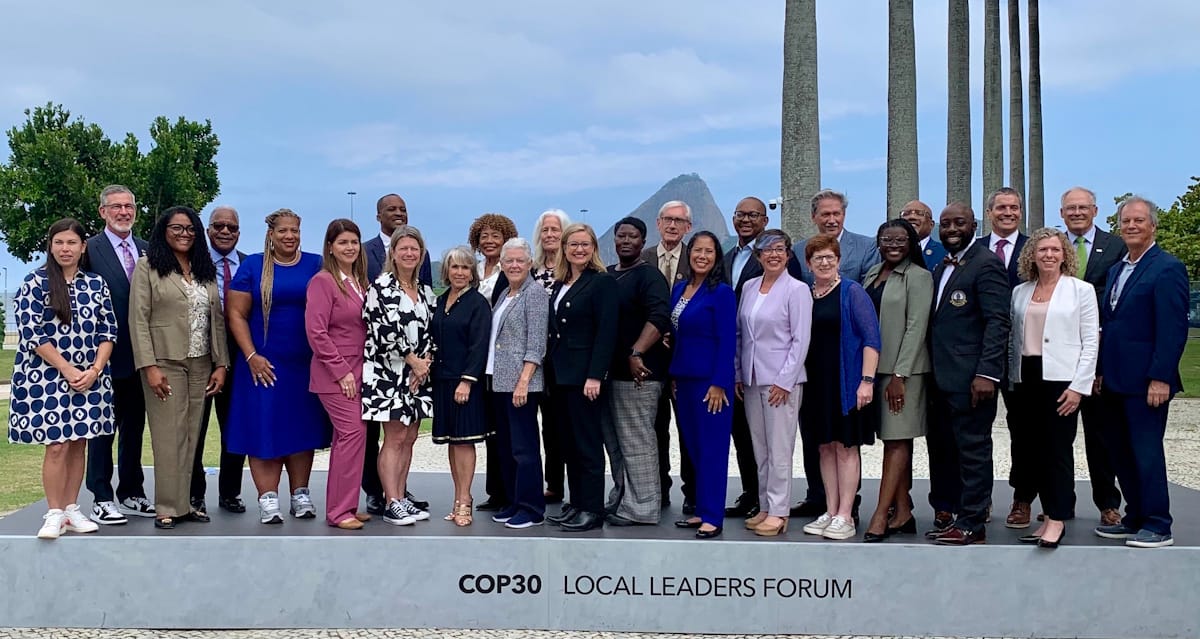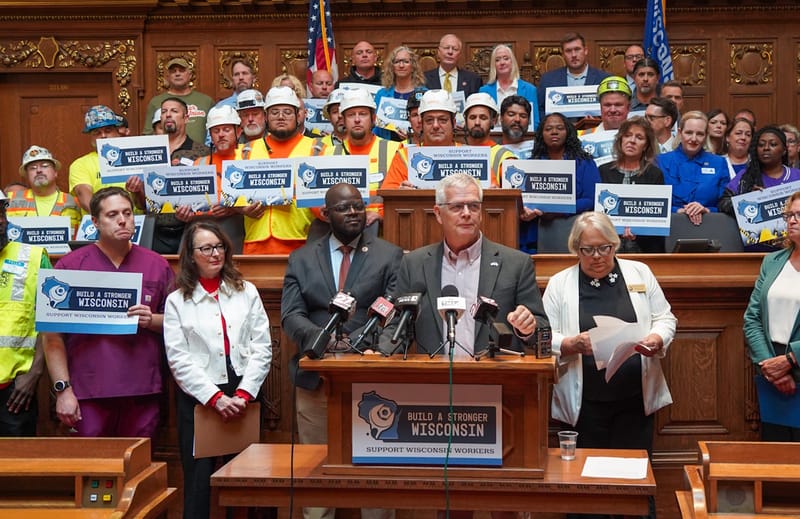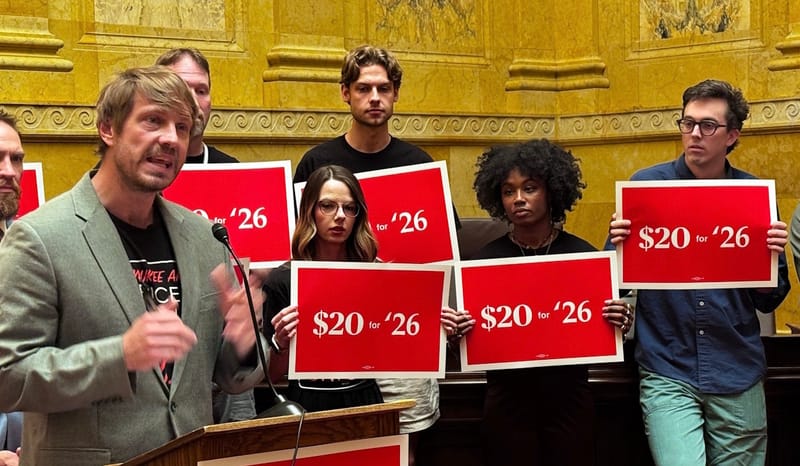States such as Wisconsin lead the way in clean energy even as federal government is in denial
From Rio de Janeiro to Belém, Wisconsin is showing how pragmatic, locally led climate action can power jobs, resilience, and economic growth.

By John Imes | Co-Founder & Executive Director, Wisconsin Environmental Initiative
• The success of state-led emission reductions and clean energy job growth despite federal uncertainty.
• On-the-ground examples of Wisconsin’s clean energy workforce, manufacturing capacity, and cost-saving community solutions.
• Why Wisconsin’s pragmatic, kitchen-table approach to clean energy is a competitive advantage — especially in a purple state.
Standing on the waterfront in Rio de Janeiro, where hundreds of mayors, governors, and regional leaders have gathered for the COP30 Local Leaders Forum, it’s clear that local action is driving global climate progress. While world leaders prepare to meet in Belém later this month, the real momentum is here — among the subnational leaders delivering measurable results where people live and work.
And Wisconsin, led by Governor Tony Evers, is front and center.
As Co-Chair of the U.S. Climate Alliance, Governor Evers joined New Mexico Governor Michelle Lujan Grisham and other U.S. state leaders to release the Alliance’s new Annual Report in Rio. The message was simple and strong: despite federal headwinds and denialism from some quarters, U.S. states are pressing forward — cutting climate pollution, growing the economy, and investing in a cleaner, more resilient future.
“We want the world to know that the United States continues to work at the state level to reduce emissions, create clean energy jobs, and increase resilience — regardless of what our president or anyone else says,” Evers told reporters at the opening session.

Subnational Leadership That Works
The U.S. Climate Alliance — a bipartisan coalition of 24 governors representing more than half the U.S. population and GDP — has reduced greenhouse gas emissions by 24% since 2005, while growing GDP by 34%. Those numbers tell a powerful story: climate action and economic growth are not opposites. They’re two sides of the same coin.
Alliance states are driving the nation’s clean-energy buildout — responsible for 70% of America’s zero-emission vehicles, 68% of all public EV chargers, and nearly 200 gigawatts of new renewable energy capacity added since 2005. Electricity-sector emissions alone have fallen 45% across member states.
That kind of steady progress is why subnational leadership is so vital. Even when Washington wavers, states and localities keep building, innovating, and creating jobs.
Solutions Exchange: From Policy to Practice
At the America Is All In “Solutions Exchange” sessions this week — co-hosted by Bloomberg Philanthropies — governors, mayors, and business leaders shared how climate policies translate into real community benefits: lower energy bills, cleaner air, and more resilient infrastructure. It’s a shift from negotiation to delivery, and Wisconsin offers a compelling example.
Our state’s clean-energy workforce now tops 75,000 jobs, spanning manufacturing, construction, agriculture, and services. Visit Milwaukee’s Menomonee Valley, and you’ll see companies like Ingeteam building EV chargers and wind-turbine components for projects across the country. These are “Made in Wisconsin” climate solutions powering the global transition.

Wisconsin’s Common-Sense Climate Playbook
In a purple state like ours, climate action succeeds when it’s rooted in kitchen-table common sense — lowering costs, creating local jobs, and protecting our air and water. That pragmatic approach is helping Wisconsin communities weather storms, modernize schools, and give businesses the predictability they need to invest.
Consider the growing number of solar installations on schools and farms, energy-efficiency upgrades in homes and small businesses, and rural areas deploying EV charging corridors that connect tourists and truckers alike. Each project cuts carbon and saves money — the definition of win-win.
Equity is also at the heart of Wisconsin’s progress. Groups like Green Homeowners United are helping low- and moderate-income families weatherize homes, replace old furnaces, and install heat pumps — ensuring the benefits of clean energy reach the people who need them most.
Resilience in the Face of Federal Uncertainty
Evers and his fellow Alliance governors are candid about the challenge ahead. With rollbacks in federal climate policy, states must stay the course — not only to meet the goals of the Paris Agreement, but to safeguard local economies and public health. As Governor Evers noted, “Even when federal leadership falters, our resolve only grows stronger.”
The Alliance’s updated targets are ambitious yet achievable: 26% emissions reduction by 2025, 52% by 2030, and 66% by 2035. Those goals are backed by data, science, and — most importantly — people on the ground who see the benefits of cleaner energy and smarter infrastructure.
Wisconsin’s Role on the Global Stage
Here in Rio, Governor Evers’ leadership reflects something larger: Wisconsin’s growing influence in the global climate conversation. As the U.S. delegation heads to Belém, the message from states like ours is clear — progress doesn’t wait for politics. It’s built city by city, farm by farm, and business by business.
For Wisconsin, that means doubling down on what works:
- Supporting manufacturers building the backbone of the clean-energy economy.
- Strengthening partnerships among businesses, farms, and communities.
- Protecting the public tools — like rebates, tax credits, and utility programs — that make the transition affordable and fair.
By staying pragmatic, collaborative, and grounded in results, Wisconsin can continue to punch above its weight — showing that climate leadership in a purple state is not only possible, it’s a competitive advantage.
That’s the Wisconsin story worth sharing — from Rio to Belém, from our neighborhoods to the world.
John Imes is Co-Founder and Director of the Wisconsin Environmental Initiative, the Wisconsin Affiliate of the American Sustainable Business Network, and serves as Village President of Shorewood Hills, Wisconsin. He is attending COP30 as an NGO Observer delegate and member of the ASBN Climate & Energy Working Group






